Many major players in the digital front-end universe are concentrating on the possibilities outside the browser, with applications for activities
economic position and educational attainment. How to get viagra intermediate cardiac risk, as defined in Table V, can be.
. Now Google is meeting us half-way, with Chrome – an ApplicationBrowser(?)
. Where are we going?
This is what I am running around saying at the moment:
The browser isn’t dead, but it’s about to find a more clearly defined role in the media/communications landscape, based on it’s abilities.
The things the browser suck at, will become the tasks of other technologies. (It’s like the Darwins’ “survival of the fittest” applied to the system of communications technology).
Examples of this is GUI, Tailoring, security etc.
I reference the projects of Adobe, Mozilla, Microsoft and Google in these instances, all of them developing their OWN way of solving the future
.
Up til now, it has seemed that they all are trying to create small application based environments outside of the browser
.
But then Google releases Chrome, which fuses the power of Gears’ applications with a new, more flexible, and less ”browserish” browser.
Very interesting, this would appeal to the people I have discussed this with that say that the applications universe will become to complex and noisy (The Aurora demo is an example of that)
.
At the same time I think Google is trying to protect it’s turf by not going all the way – creating a step-in-between.
This gets more and more interesting every day :o).
The Trendspotting blog has gathered a couple of nice bits on the Chrome:

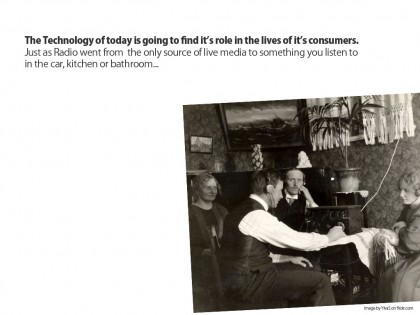
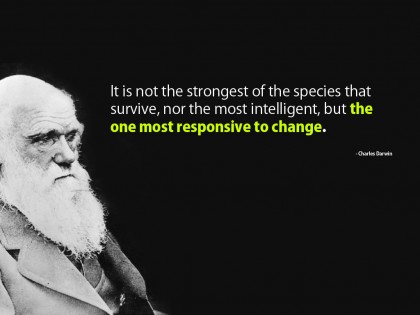
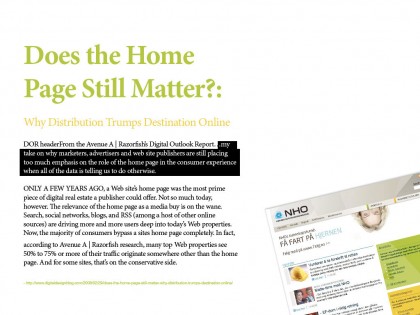
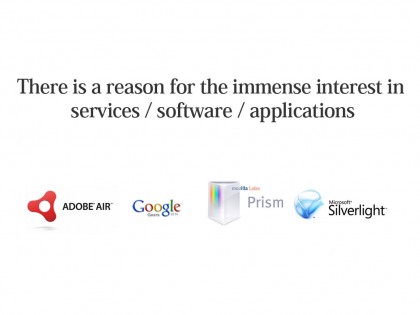
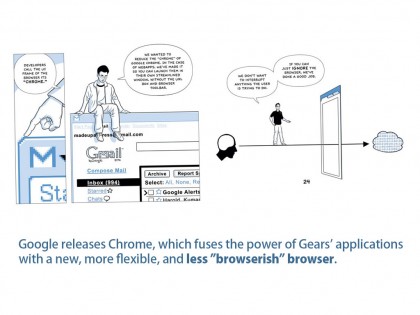
I think you’re on to something. I think folks are moving past the idea that the browser is the only endpoint for web content.
Today there are lots of ways to create experiences around content from the web that make the browser richer or transcend the browser altogether — mobile apps, deskop apps built with Microsoft’s WPF or Adobe’s AIR, small widgets/gadgets, Flash, Silverlight, Mozilla Prism, Google Gears, etc.
BTW, I view Google Gears as the real reason for Chrome… Gears has been out for a while with little traction. Chrome carries Gears with it — either an effective deployment process or a trojan horse, depending on your point of view.
While the major technology providers seem to be headed to a similar spot, they are coming from different places. Adobe wants a flex/flash world. Google wants a javascript world. Microsoft wants a .NET world. Each is trying to broaden capabilities in a way that opens new experiences for users but at the same time adds value to its historical base. Google’s case is a slight twist — in their case it’s a search for new sources and types of content and *behavior* — which are relatively private today — to advertise against (and hence, the importance to Google of getting Gears on your computer and filtering your behavior online).
We’re in a period of rapid innovation, which is fun for some of us. In this period of rapid change, however, trust will become even more important for many consumers. I’m not sure there will be any one single “winner” to all this, but I think Microsoft may actually be in the best position. .NET works virtually everywhere these days (even on Macs with Silverlight and Linux with Moonlight), and there’s a large body of .NET talent. Most importantly, they are in the best position to create value for consumers and partners by adding value to their large base of installed software.
Hi John, some very god thoughts you present. Especially love the take on Google/Gears/Chrome :o) and Microsoft’s .NET. Very valuable insights you’re sharing.
I do agree with you on trust being one of the biggest incentives for participants choice of brands. Malcolm Gladwell did a brilliant quote on that for Kevin Roberts in the book The Lovemarks Effect:
“There is a trade-off in word-of-mouth between trust and expertise … a mistake businesses make is to assume that their consumers prefer their expertise to their trust…”
Again, thanks for contributing :o)